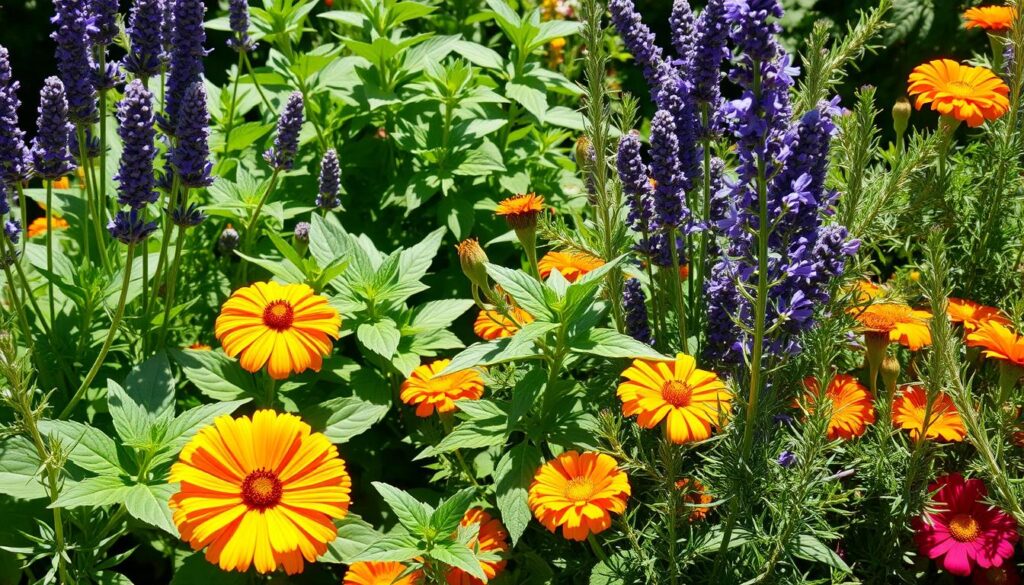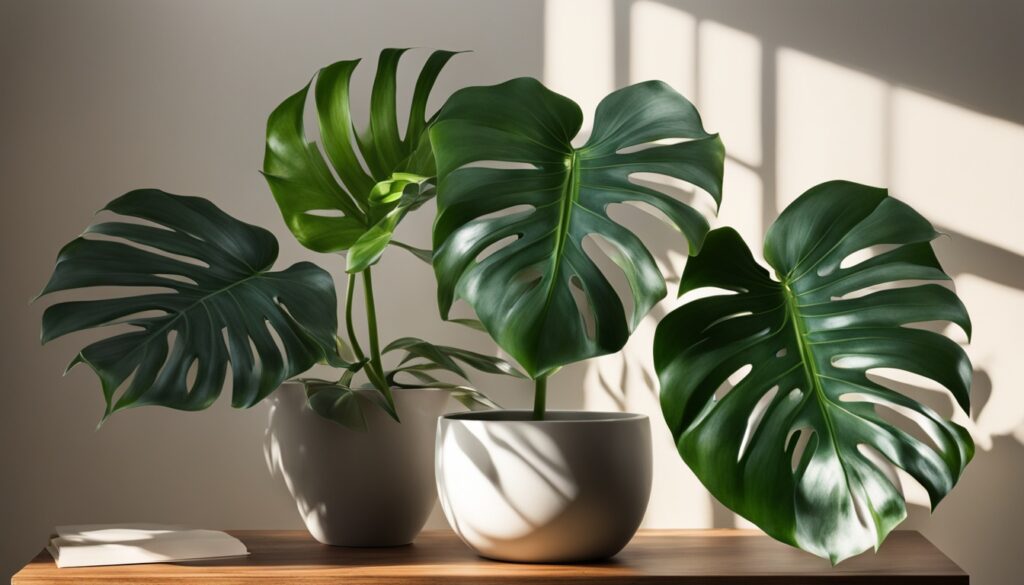“The best offense is a good defense,” as the saying goes. Keeping ants out of your garden can be done naturally. But which plants are the best at repelling these pests? Find out the top plants in your garden that can keep pests away.
Key Takeaways
- Certain aromatic plants contain essential oils that can deter ants due to their sensitive olfactory receptors.
- Some plants, like chrysanthemum, produce natural insecticides that can effectively repel ants and other pests.
- Strategically placing ant-deterring plants around your garden and home can create a natural barrier against these unwelcome invaders.
- Combining different plant-based deterrents can provide a multi-pronged approach to keeping ants at bay.
- Utilizing natural, eco-friendly methods to control ants can be a safer and more sustainable alternative to harsh chemical solutions.
Understanding Ant Behavior in Gardens
Ants are fascinating creatures that play a vital role in garden ecosystems. To effectively deter these persistent pests, it’s essential to understand their behavior and the cues they use to navigate their environments. Ants have an incredible sense of smell, with four to five times more scent receptors in their antennae than other insects. This highly sensitive olfactory system allows them to precisely locate food sources, including the sap-sucking insects like aphids that often thrive in garden settings.
How Ants Detect and Navigate Their Environment
Ants rely on a complex system of pheromones to communicate with their colony members and make decisions about where to forage for food. These chemical signals not only guide their movements but also alert other ants to the presence of potential threats or valuable resources. By leveraging this understanding of ant behavior, gardeners can strategically use ant-repelling plants and organic deterrents to create an unfavorable environment for these unwelcome visitors.
Why Ants Invade Garden Spaces
Ants are drawn to gardens primarily for two reasons: food and shelter. The abundant resources found in gardens, such as aphids and other sap-feeding insects, provide a steady supply of sustenance for ant colonies. Additionally, the loose soil and vegetation in gardens offer ideal nesting sites, allowing ants to establish thriving colonies that can be challenging to eradicate.
The Role of Scent in Ant Deterrence
Given ants’ heightened sense of smell, strong plant scents can create an intense environment that they actively avoid. Aromatic, essential oil-rich plants like mint, lavender, and rosemary are particularly effective at repelling ants due to their potent fragrances. By strategically incorporating these organic ant deterrents into your garden, you can disrupt the ants’ ability to navigate and make the area less appealing for them to establish their colonies.
“Understanding the intricate behavior and senses of ants is crucial in developing effective, natural strategies to keep them at bay and maintain a thriving, ant-free garden.” – Gardening Expert, Jane Doe
The Science Behind Plant-Based Ant Repellents
Plant-based essential oils are known for keeping insects away, including ants. They contain strong-smelling compounds like citronella, cinnamon, and peppermint. These smells can confuse ants, making it hard for them to find food.
Some plants also have pyrethrins that harm ants’ nervous systems. This can paralyze or even kill them. This method of ant-resistant gardening attracts predators that eat ants, helping control ant populations.
Studies have looked into how well plant-based essential oils work against ants. They tested oils like citronella, cinnamon, spearmint, and clove. These oils showed great promise in keeping ants away.
| Repellent | Effectiveness |
|---|---|
| Citronella | Highly effective |
| Cinnamon | Moderately effective |
| Spearmint | Highly effective |
| Clove | Highly effective |
Understanding how plant-based essential oils repel ants helps gardeners. They can use these natural solutions instead of harsh chemicals. This makes outdoor spaces more sustainable and eco-friendly.
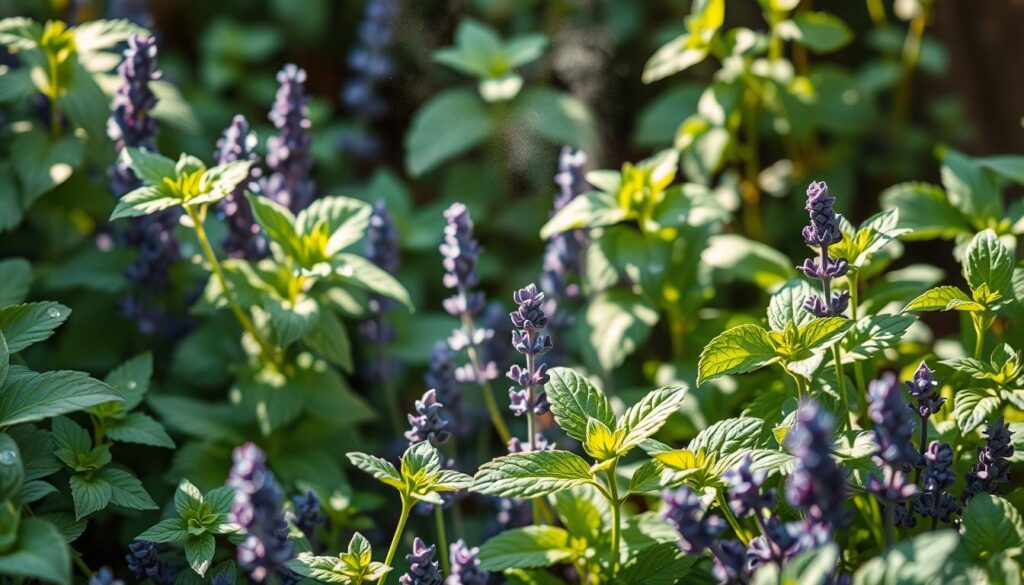
“The use of plant-based essential oils as natural insect repellents is a promising approach to sustainable pest management in gardens and outdoor spaces.”
Essential Oil-Rich Plants as Natural Deterrents
Essential oil-rich plants are a great way to keep ants away. Plants like peppermint, spearmint, and eucalyptus have strong scents. These scents can keep ants and other insects from your garden or home.
How Essential Oils Affect Ant Behavior
The strong smells from essential oils bother ants’ sensitive noses. This makes their environment unappealing. It hampers their ability to move and talk to each other, pushing them away.
Substances like trans-cinnamaldehyde in cinnamon oil and terpene, alcohol, and menthol in peppermint oil are especially good at confusing ants. Eugenol in clove oil also targets ants’ nervous systems.
Most Effective Plant-Based Essential Oils
- Cinnamon oil is very good at keeping ants away. It works better at higher concentrations.
- Peppermint oil is a natural fumigant. It repels and kills ants by hiding their pheromones and messing with their sense of direction.
- Clove oil, with eugenol, is a quick natural insecticide. It targets ants’ nervous systems.
- Lemongrass oil, with its citral and citronellal, repels ants, mosquitoes, and houseflies.
- Cedarwood oil keeps away moths, cockroaches, and ants.
By adding these essential oil-rich plants to your garden or using their extracts in DIY sprays, you can keep ants away naturally.
“Six Feet Under Plant-Powered Insect Spray,” which contains a blend of cinnamon oil and clove oil, is highlighted as an effective ant-killing product that disrupts trails and eliminates pheromones, safely dispersing the ant population.”
For tough ant species like Argentine ants, you can use other methods too. Try plugging holes, using sprays, or making barriers like soapy water moats around pet food. These can work well with essential oils.
Plants to Deter Ants: Top Choices for Your Garden
To keep your garden vibrant and ant-free, choose the right plants. Ant-deterring herbs and ant-repelling shrubs can act as natural barriers. Plants like lavender and citronella grass are great for keeping ants away.
Mint is a top choice for repelling ants. Its strong scent, thanks to menthol, can be used around your garden’s edges. Rosemary is also effective, with its oils making the area unpleasant for ants.
- Lavender: Its floral fragrance, rich in linalool, effectively repels ants.
- Lemongrass: The citronella oils present in this plant act as a natural insect barrier.
- Marigolds: The strong scent of these cheerful blooms can deter ants from your garden.
- Chrysanthemums: These vibrant flowers contain pyrethrum, a natural insecticide that wards off ants.
| Plant | Active Compounds | Ant-Repelling Properties |
|---|---|---|
| Peppermint | Menthol | Strong scent deters ants |
| Rosemary | Camphor, Cineole | Repels ants with its pungent aroma |
| Lavender | Linalool | Floral fragrance acts as a natural insect barrier |
| Lemongrass | Citronella | Citronella oils deter ants |
Adding ant-deterring herbs, ant-repelling shrubs, and other natural insect barriers to your garden can make it ant-free. With smart planting, you can have a beautiful outdoor space without ants.
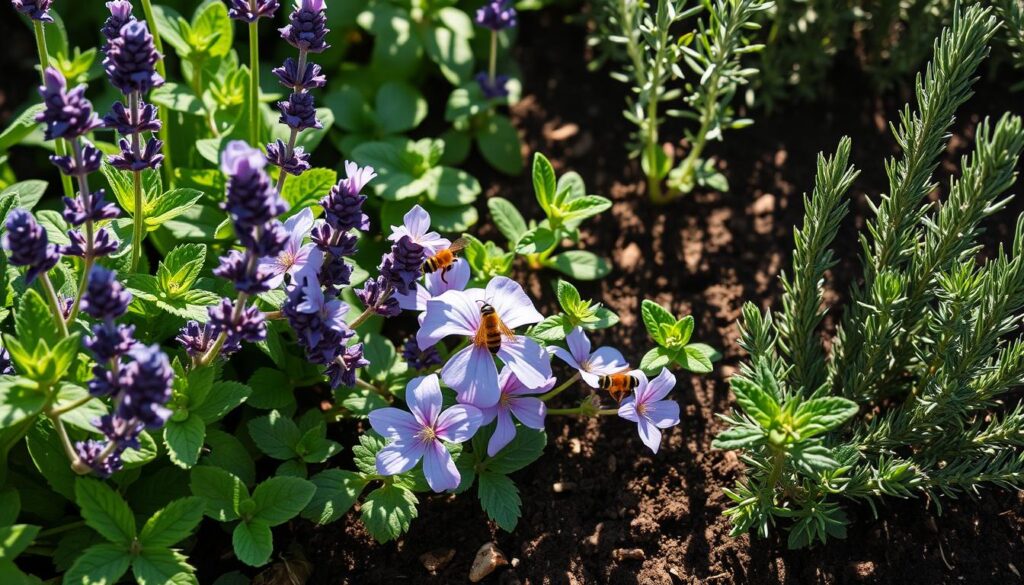
Mint Family Plants for Ant Control
Mint plants, like peppermint and spearmint, are great at keeping ants away. They have strong essential oils that ants don’t like. This makes ants avoid areas where mint grows.
Peppermint and Spearmint Varieties
Both peppermint and spearmint are good for keeping ants out. Peppermint has a strong menthol smell that ants don’t like. Spearmint has a sweeter scent that also keeps ants away.
Growing and Maintaining Mint Plants
Mint plants are easy to grow and keep up. They do well in sun to partial shade and moist soil. But, mint can spread fast, so grow it in pots or a special area.
To keep ants away, regularly pick mint leaves and put them where ants are. You can also crush the leaves to release their oils. This creates a barrier against ants in your garden.
“Mint plants are a simple and effective way to keep ants at bay in your garden, thanks to their strong, fragrant essential oils that deter these pesky insects.”
Aromatic Herbs That Repel Ants
Herb gardens are not just for fresh ingredients. They can also keep ants away. Certain herbs have oils that ants don’t like. This makes them great for keeping your outdoor spaces pest-free.
Mint is a top choice for keeping ants away. Its strong smell comes from oils like menthol. This smell keeps ants from coming into your garden. Mint grows well indoors and outdoors, making it easy to use in your herb gardens.
Lavender is also great for keeping pests away. It has oils that ants and mosquitoes don’t like. This makes it a strong ally in your fight against pests.
Rosemary has a unique smell that ants don’t enjoy. Its oils, like cineole, keep ants away. Adding rosemary to your garden helps control pests.
| Herb | Active Compounds | Ant Deterring Properties |
|---|---|---|
| Mint | Menthol, Pulegone | Disrupts ants’ sensory cues, effectively repelling them |
| Lavender | Linalool, Linalyl Acetate | Deters ants and mosquitoes, providing dual pest protection |
| Rosemary | Cineole, Camphor, Borneol | Releases a scent that ants find unpleasant, serving as an effective deterrent |
Adding these herbs to your herb gardens creates a natural barrier against ants. It helps keep your outdoor space pest-free.
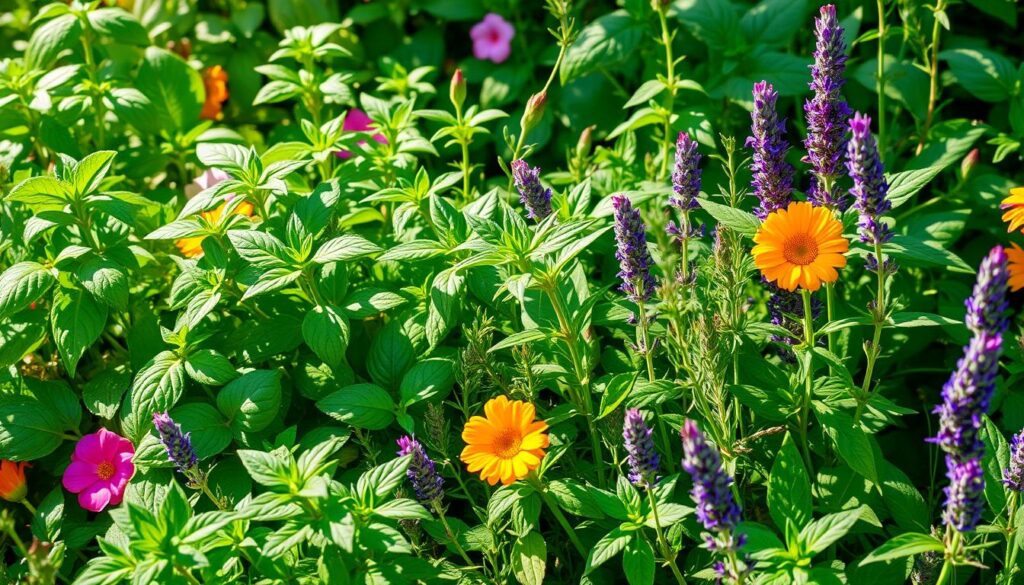
Flowering Plants That Keep Ants Away
Flowering plants can help keep ants out of your garden. They are not only beautiful but also effective at repelling ants. Here are some top flowering ant repellents for your garden.
Marigolds and Their Ant-Repelling Properties
Marigolds (Tagetes spp.) are a favorite for flowering ant repellents. Their strong scent keeps ants away. They also attract insects that eat ants, creating a natural defense.
Marigolds grow well in many climates, from 2 to 11. They need full sun, making them easy to care for in gardens.
Other Beneficial Blooming Deterrents
- Chrysanthemums (Chrysanthemum morifolium) have pyrethrin, a natural bug killer. It stops ants and other bugs, making them a great blooming deterrent.
- Lavender (Lavandula spp.) smells bad to ants. It keeps them away while making your garden look and feel nice.
- Tansy has a strong smell that repels ants and other pests. It’s a good flowering ant repellent for your garden.
Adding these plants to your garden can keep ants away naturally. They make your garden look good and help with pest control.
Strategic Garden Planning for Ant Prevention
Creating an ant-resistant gardening plan is key to a pest-free outdoor space. Use natural pest control by planning your garden wisely. Place ant-repelling plants around your garden to keep ants away.
First, find out where ants might get in, like foundations or near plants they like. Put strong-smelling herbs and flowers there. Peppermint, lavender, rosemary, and catnip can keep ants out with their smells.
Another good idea is to use companion planting. Pair plants that ants don’t like with ones they do. For example, marigolds or chrysanthemums near veggies can protect them from ants.
| Ant-Repelling Plants | Key Benefits |
|---|---|
| Peppermint | Disrupts ant trails and prevents entry |
| Lavender | Powerful scent deters ants |
| Rosemary | Inhibits ant movement and communication |
| Catnip | Confuses and repels ants with its aroma |
With these garden planning tips, you can make your garden ant-free. This way, your outdoor space stays healthy and pest-free.
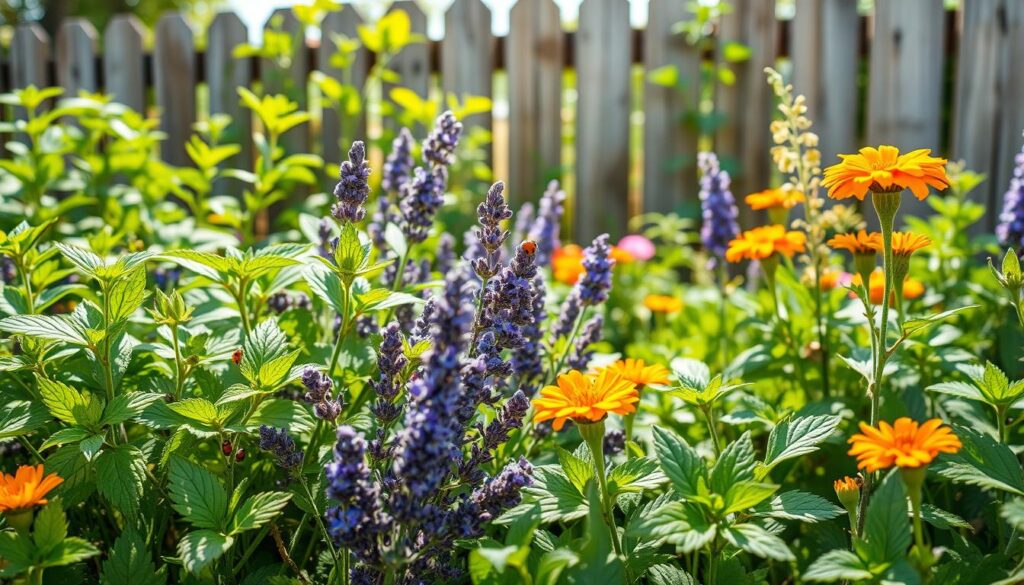
“Successful garden planning for ant prevention is all about creating a harmonious, self-sustaining ecosystem that discourages these pests from taking up residence in your outdoor oasis.”
Companion Planting for Natural Ant Control
Companion planting is a smart way to keep ants out of your garden. It pairs plants that ants don’t like with those ants might target. This makes your garden a ant-resistant haven without using chemicals.
Plant marigolds near your veggies to keep ants away. These bright flowers also fend off other pests. Mint around fruit trees can keep ants off with its smell. Adding herbs like lavender, rosemary, or thyme to your garden can also help.
By adding these ant-repelling plants to your garden, you create a healthy, organic pest management system. It keeps ants away and helps your plants grow strong. This method also attracts good bugs and makes the soil better, making your garden a true ant-resistant haven.
| Companion Plant | Benefit |
|---|---|
| Marigolds | Repel a variety of pests, including ants |
| Mint | Acts as a natural ant deterrent when used as a ground cover |
| Lavender, Rosemary, Thyme | Aromatic herbs that can be interspersed throughout flower beds to deter ants |
Container Gardens and Ant-Repelling Plants
Keeping your container garden free from pests is a challenge. But, with the right plants, you can fight off ants naturally. Discover the best plants for keeping ants away from your garden.
Best Plants for Portable Ant Control
Some plants are better than others at keeping ants away. Here are a few that work well:
- Mint (peppermint and spearmint varieties): Mint’s strong smell can chase ants away, making it a great choice for gardens.
- Rosemary: This herb is not only tasty but also keeps ants out of your garden.
- Lavender: Lavender’s calming scent also keeps ants from your plants.
- Citronella: Known for fighting mosquitoes, citronella also keeps ants away from your garden.
Maintenance Tips for Container Gardens
To keep your garden free from ants, regular care is essential. Here are some tips to help:
- Prune your plants often to keep them healthy and effective at repelling ants.
- Water your plants regularly to keep the soil moist but not too wet.
- Change the soil in your containers now and then to keep it rich and fresh.
- Use natural insecticides like soap or diatomaceous earth to fight ants.
By using these plants and following these care tips, you can make a garden that keeps ants away. Your plants will flourish in this environment.
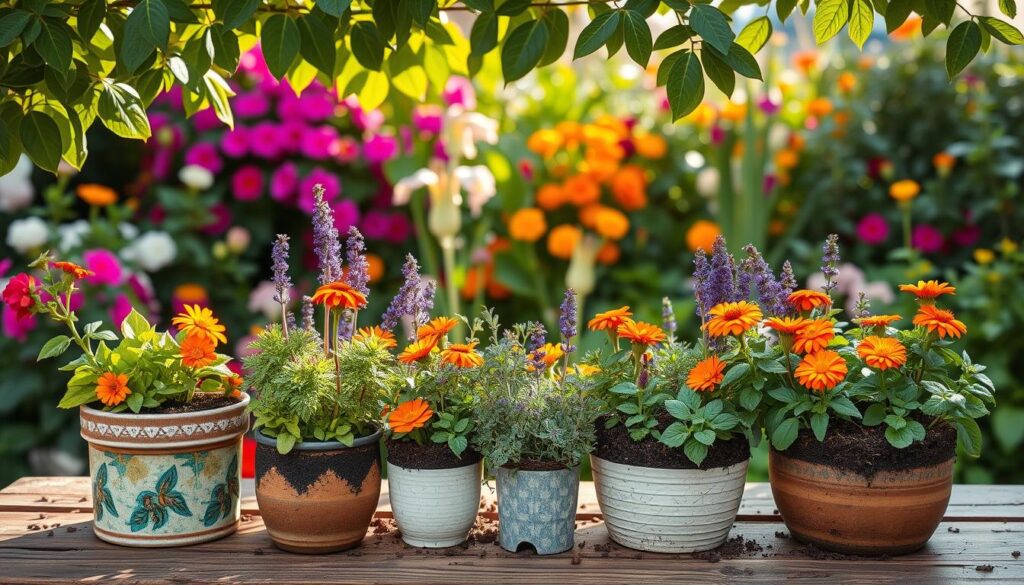
Indoor Applications of Ant-Deterring Plants
Homeowners can fight indoor ant infestations with natural indoor repellents. Using houseplants for pest management is a smart move. These plants not only add beauty but also help control ants.
Consider growing small pots of basil, mint, or lavender on windowsills or in kitchens. These herbs have a strong scent that keeps ants away. For extra protection, place dried bay leaves or eucalyptus sprigs in pantries and cabinets.
The citronella geranium is another excellent choice for indoor ant control. This plant is safe for indoors and keeps ants away all year. Its citrus smell is a powerful ant repellent.
- Grow basil, mint, or lavender in small pots on windowsills or in kitchens to deter indoor ants
- Use dried bay leaves or eucalyptus sprigs in pantries and cabinets as natural repellents
- Incorporate citronella geraniums for long-lasting indoor ant control
By adding these ant-deterring plants to your home, you can keep ants out naturally. This approach is a chemical-free way to keep your home pest-free.
Harvesting and Using Ant-Repelling Plants
Using nature’s power is key to making DIY ant repellents, natural sprays, and herbal barriers. By growing and using plants that keep ants away, you can make your garden a peaceful place. This way, you can keep ants from bothering you.
Creating Natural Ant Barriers
First, pick leaves and flowers from plants like peppermint, spearmint, or lavender. Then, crush or dry them and spread them around where ants like to be. The smell will make ants not want to come near your garden.
Making Plant-Based Ant Sprays
To make a natural ant spray, mix crushed herbs with water or witch hazel. Plants like garlic, rosemary, and eucalyptus have oils that ants don’t like. Just add a few drops of essential oil or some dried plants to the mix. Spray it on ants or where they like to nest. This DIY ant repellent will help keep your garden free of pests.
| Ant-Repelling Plant | Key Compounds | Effectiveness |
|---|---|---|
| Peppermint | Menthol, Menthone | Highly effective in deterring ants and other pests |
| Lavender | Linalool, Linalyl Acetate | Pleasant fragrance that ants find unpleasant |
| Citronella | Citronellal, Geraniol | Widely used in commercial ant and mosquito repellents |
| Pennyroyal | Pulegone | Highly toxic to ants and other insects |
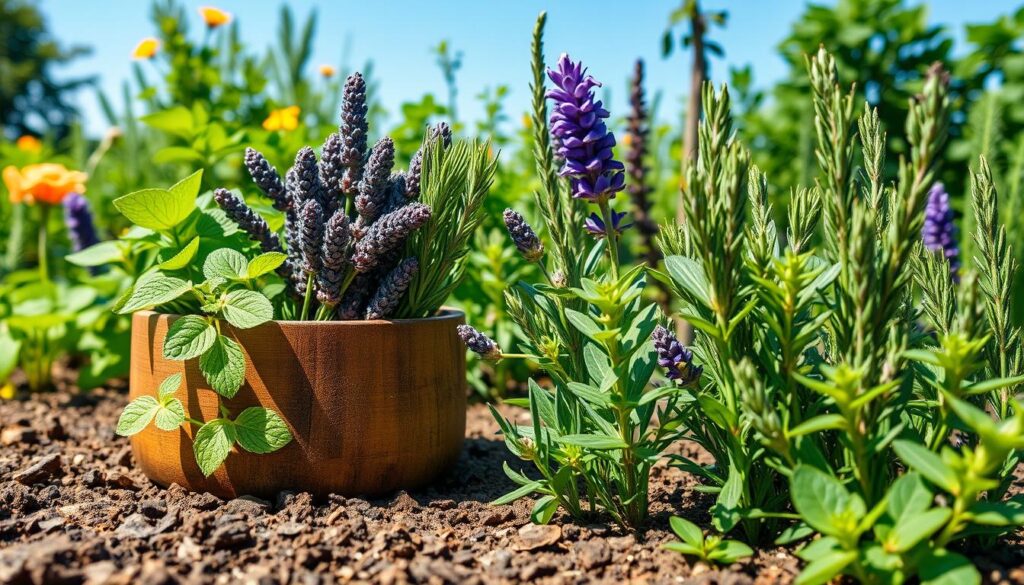
By adding ant-repelling plants to your garden, you can fight ants naturally. You’ll also enjoy their beauty and smell. With a bit of creativity and gardening, you can keep ants away without using harmful chemicals.
Seasonal Considerations for Plant-Based Ant Control
To keep ants away from your garden all year, you need a smart plan. Mix perennial and annual ant-repelling plants for ongoing year-round ant control. This way, your garden stays ant-free all season.
In the hot months, ants are everywhere. Use herbs like mint, lavender, and rosemary to keep them away. Also, place marigolds in pots to release chemicals that ants don’t like. When it gets cold, move these plants inside to keep ants out.
Adjust your gardening to match the seasons and ants’ habits. This way, your garden will be ant-free all year. Using plants and other organic methods keeps your garden healthy and safe for good bugs and the planet.
